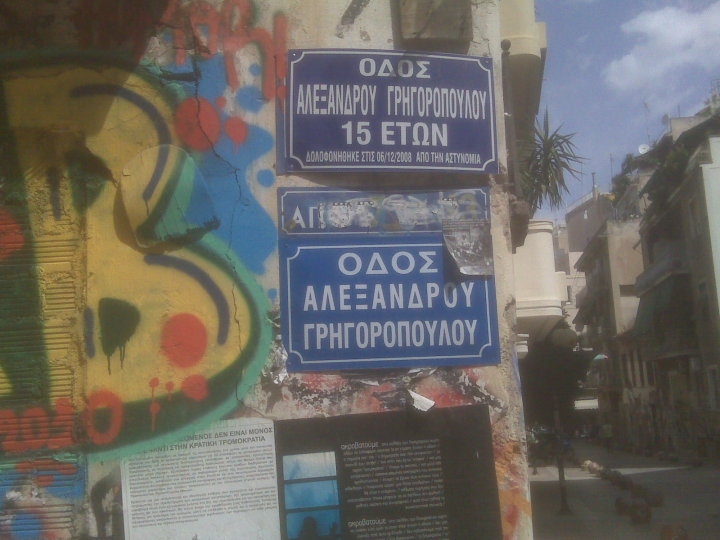Mike Kay spoke to Stavros and Paulin from OKDE (Organisation of Communist Internationalists of Greece) in Athens.

MK: Greece has been the focus of much of the debate about the problems of the European economy. Why does it occupy this special positon?
OKDE: For several reasons, Greece is the weak link in the chain of the European Union (EU). Firstly, due to the weakness of Greek capital due to the reduction in the productive bases of industry and agriculture. Secondly, because of the weaknesses in the EU as a whole – renegotiation or non-payment of “toxic” debt may lead to the collapse of German and French banks. This maybe enough to set off a “domino effect” leading to the collapse of several countries’ economies. Thirdly, there is the Greek movement against austerity, of which the latest pact from the International Monetary Fund (IMF) and EU is trying to break the backbone. Lastly, there is a very deep political crisis; the disintegration of the Pasok (Socialist party) government may have already begun.
What have been the immediate effects of the crisis for Greek workers?
Precariousness in employment has gone from being a marginal phenomenon to an everyday one. The labour aristocracy is being destroyed due to cuts in the public sector. Whole layers of the middle class are being destroyed. The attacks on the welfare state mean that now even the right wing newspapers are reporting that the long-term unemployed are forced to turn to the churches for food relief. Meanwhile the Greek bourgeoisie has totally capitulated to the IMF and EU. They are like Vichyists! Their only concern has been to try and save some small parts of Greek capital connected with the banking and finance sector. Most probably Greece will become the first country to be expelled from the Eurozone. It shows the depth of the crisis that one of the main strategic goals of the EU, the Euro, may be on the verge of collapse. If they do manage to preserve it, it will be on the basis of a very strict hierarchy. The European Central Bank would control Greece’s budget extremely tightly.
The social crisis in Greece first came to the attention of the world in December 2008 when the country errupted in riots sparked by the fatal police shooting of 15 year old Alexandros Grigoropoulos. What has happened since about bringing Alexis’ killers to justice? Currently the trial of the police officers involved is drawing to an end. The judge is proposing that the cop is freed due to lack of evidence. The trial was held in a small city outside of Athens to prevent demonstrations. The movement of 2008 was mostly a youth revolt. The working class did not participate energetically – rather they looked on with sympathy. Now, we have broader social layers mobilising with deeper social potential.
Recently a protest resulted in the death of three bank workers who were asphyxiated by fumes from Molotov cocktails. What was behind that story?
Since 2008, the anarchists have experienced fast growth, and have participated in acts of individual violence. Throwing of Molotovs and so on is common. It is not unexpected to burn a bank. The workers in the bank had wanted to strike on that day, but the boss locked them in. The building itself was not safe to use as a bank. Of course the right wing tried to use this incident to discredit the movement, but most people did not believe what they said.
How do you explain the particular militancy of the movement?
To have a general strike in Greece it is not such a big deal. This is because of the history of struggle. Three times bourgeois power has been challenged: in 1936 in Thessaloniki, again in the resistance movement against the Nazis and finally against the military coup in 1973.There has never been a heavy role of the trade union bureaucracy. The reformist party Pasok does not have deep roots in the workers movement. It was set up from scratch in 1974, and was from the beginning a bourgeois party. There is workers’ democracy in the function of the unions, and traditionally the far left has had quite wide influence. What is lacking is a co-ordinating centre for the militant mood.

How did your tendency evolve?
OKDE is the oldest far left organisation in Greece after the Communist Party which was founded in 1918. We started out as the Left Opposition within the Communist Party from 1927, and became a separate organisation in 1934. At the time of the coup in 1967, we were part of the United Secretariat of the Fourth International. Our organisation was rebuilt in 1974 as OKDE, but we disagreed with the leadership of the U-Sec over the policy of dissolving parties, etc. There is a different organisation called OKDE-Spartakos which is trying to find a Greek way of setting up an anti-capitalist party. We have good relations with them. In the mid 1980s the U-Sec decided to recognise Spartakos as the official organisation, although their current membership has no continuity with the original OKDE group. They are mainly an organisation of students, we are mainly workers. Spartakos do not intervene in the movement autonomously. In contrast, an initiative from our comrades in Thessaloniki has set up several “first level” unions from scratch in a struggle involving restaurant workers not unlike what Unite union is doing in New Zealand.

Just another WordPress site
For Greek news please check nea which is one of the leading sites with news in Greece. Of course it’s written in Greek but you can translate the main news using Google translate.